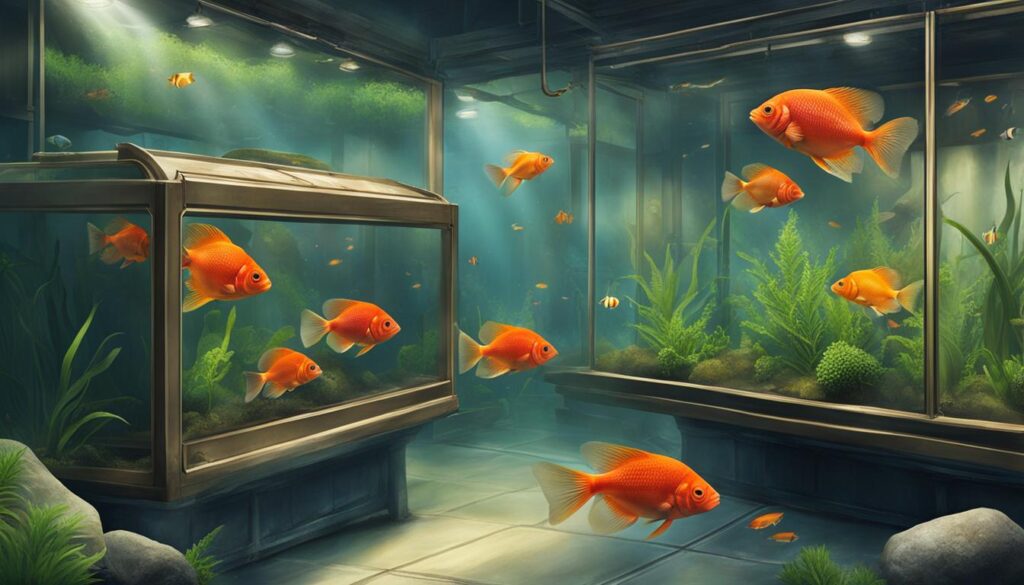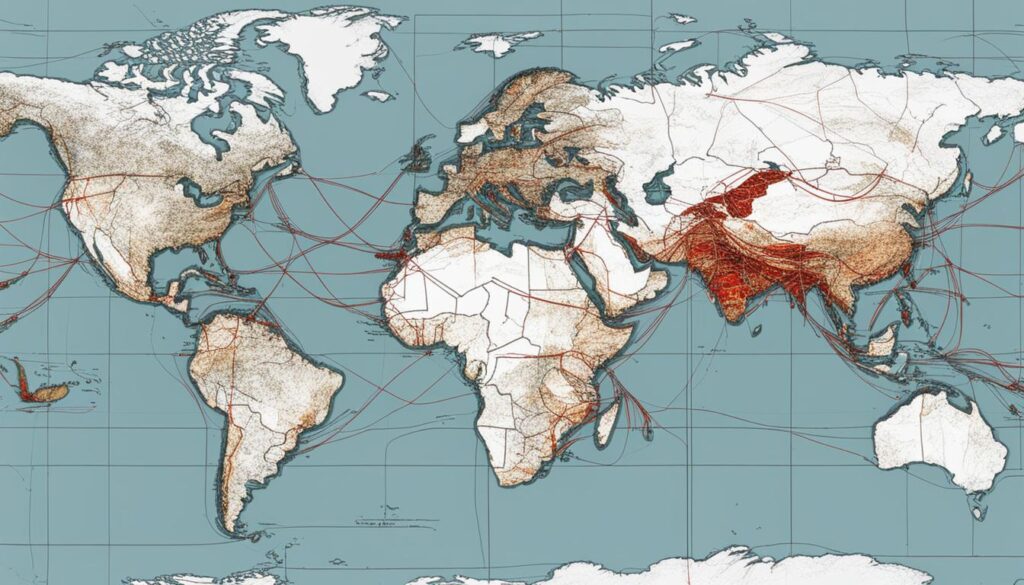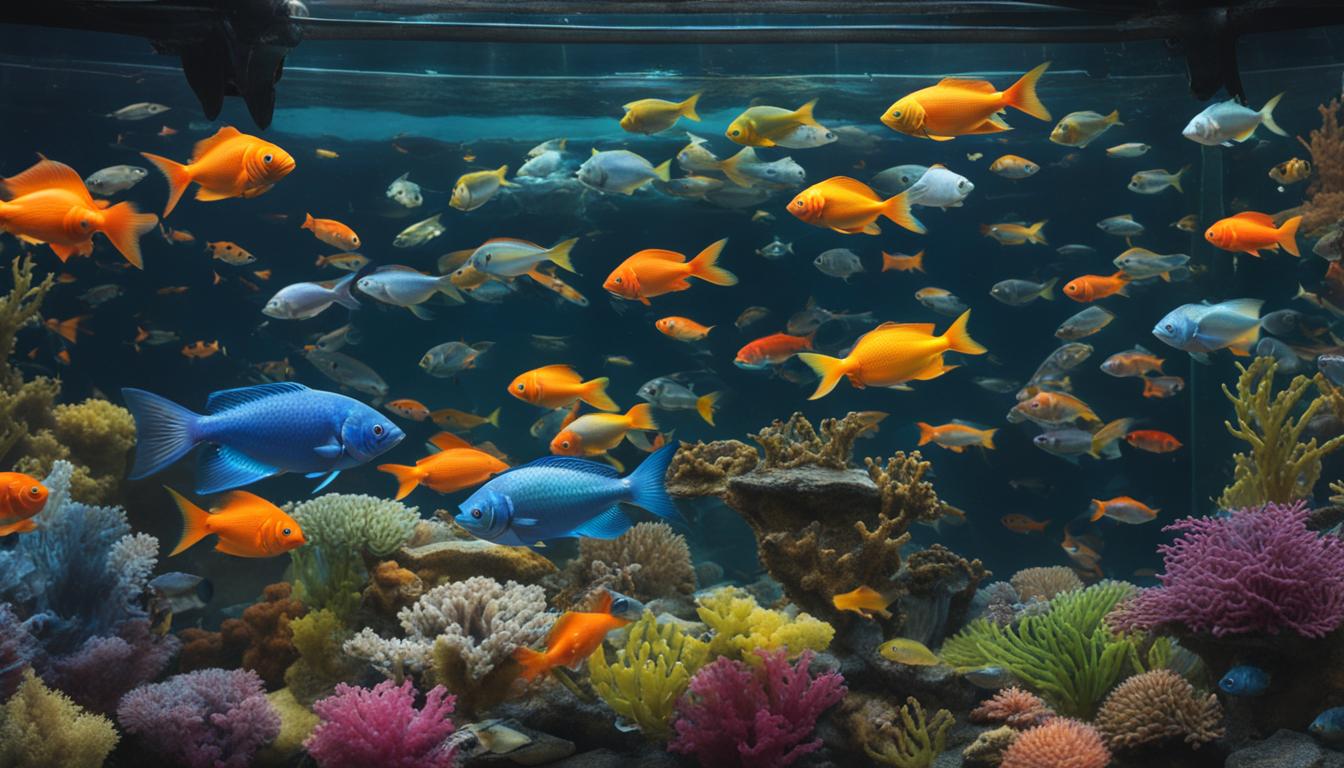The Ethical Debate: Understanding the Impact of the Ornamental Fish Trade
The ornamental fish trade is a global industry that raises important ethical questions regarding wildlife conservation, animal welfare, and economic implications. While fish tanks bring joy and relaxation to many people, it is crucial to consider the potential consequences of this trade.
Fish kept in small tanks often suffer from inadequate living conditions that negatively impact their well-being. Moreover, the collection of fish from the wild for trade purposes can have detrimental effects on local ecosystems. This article delves into the ethical debate surrounding the ornamental fish trade, highlighting its implications on wildlife conservation, animal welfare, and the global market.
Key Takeaways:
- The ornamental fish trade raises ethical concerns regarding animal welfare and the well-being of fish kept in captivity.
- Collecting fish from the wild for trade purposes can harm local ecosystems and contribute to species depletion.
- The ornamental fish trade is a multi-billion dollar industry with significant economic implications.
- Sustainable practices, such as captive breeding and responsible collection methods, are crucial for minimizing environmental impacts.
- Greater international regulation and coordination are needed to address ethical considerations and establish standards for the trade.
The Captive Fish Experience: Ethical Considerations and Animal Welfare
Keeping fish in captivity raises ethical concerns related to animal welfare. Fish are sentient beings, capable of experiencing pain and exhibiting cognitive abilities. Many fish in the ornamental fish trade live in small tanks that do not meet their physical and psychological needs. These tanks can be overstocked, leading to poor water quality and increased stress levels for the fish. The trade also involves the capture of fish from the wild, which can result in high mortality rates during transport and acclimation. It is important to consider the ethical implications of keeping fish in captivity and whether the benefits of the trade outweigh the potential harm to the animals involved.

Fish in captivity may experience inadequate living conditions that can negatively impact their well-being and overall welfare. Ethical considerations are essential when evaluating the ornamental fish trade.
Environmental Effects: Wildlife Conservation and Sustainable Practices
The ornamental fish trade has significant ecological implications, particularly for marine species. While many freshwater fish are bred in captivity, the majority of marine fish in the trade are collected from the wild. This can lead to localized species depletion and extinction, as well as the destruction of coral reefs and other habitats. The trade also contributes to destructive fishing practices and the use of toxins like cyanide, which can harm non-target species and coral reefs. It is crucial to promote sustainable practices in the trade, such as captive breeding and responsible collection methods, to mitigate the environmental effects and ensure the long-term conservation of fish species and their habitats.
One of the key environmental effects of the ornamental fish trade is the impact on wildlife conservation. The collection of marine fish from the wild can result in the depletion of populations and even the extinction of certain species in localized areas. This loss of biodiversity can have far-reaching ecological consequences, as each species plays a vital role in maintaining a balanced ecosystem.
Furthermore, the destruction of coral reefs and other habitats during the collection process poses a significant threat to marine ecosystems. Coral reefs are among the most diverse and fragile habitats on Earth, providing a home for countless species. The use of destructive fishing practices, such as the use of cyanide to stun fish, not only harms the targeted species but also damages the delicate structures of coral reefs and affects the overall health of these important ecosystems.
By promoting sustainable practices in the ornamental fish trade, we can minimize the negative environmental effects and ensure the long-term conservation of fish species and their habitats.
Sustainable practices in the trade include captive breeding programs, where fish are bred in controlled environments, reducing the need for wild collection. This not only helps to conserve wild populations but also ensures a sustainable supply of fish for the trade. Additionally, responsible collection methods can be employed, such as using non-destructive capture techniques and avoiding the use of harmful chemicals.
Benefits of Sustainable Practices
Implementing sustainable practices in the ornamental fish trade has several benefits:
- Conservation of wild populations: By reducing the reliance on wild-caught fish, sustainable practices help to conserve unique and vulnerable species in their natural habitats.
- Preservation of ecosystems: By minimizing habitat destruction and preventing the use of harmful fishing techniques, sustainable practices protect the delicate balance of marine ecosystems.
- Economic stability: Sustainable practices promote long-term economic stability by ensuring a sustainable supply of fish for the trade and supporting the livelihoods of those involved in the industry.
By prioritizing wildlife conservation and implementing sustainable practices in the ornamental fish trade, we can better protect the environment and ensure the well-being of fish species for generations to come.
The Global Market: Economic Implications of the Ornamental Fish Trade
The ornamental fish trade is a thriving industry with a global market reach, generating significant economic implications. With the United States leading as the largest importer of ornamental fish, followed by the European Union and Japan, this trade has a wide international presence. Notably, Southeast Asia and Florida act as significant contributors in producing captive-bred freshwater fish, while countries like Indonesia, the Philippines, and Malaysia export substantial quantities of marine fish.
The economic impact of the ornamental fish trade extends beyond import and export figures. It provides employment opportunities and contributes to rural development, particularly in developing fish-producing countries. The industry’s revenue and growth potential have led to the establishment of fish farms and breeding facilities, creating jobs for local communities and fostering economic sustainability.
Yet, despite its economic benefits, the ornamental fish trade faces challenges. One notable concern is the lack of comprehensive regulation, which paves the way for unsustainable practices and potential detrimental effects on the environment and animal welfare. To ensure the long-term viability of the trade and minimize its negative impact, it becomes imperative to implement greater international restrictions and promote ethical and sustainable trade practices.
| Key Players in the Ornamental Fish Trade | Largest Importers | Largest Producers | Largest Exporters |
|---|---|---|---|
| United States | Southeast Asia | Southeast Asia | Indonesia |
| European Union | Florida | Florida | Philippines |
| Japan | – | – | Malaysia |
Table: Key players in the ornamental fish trade, highlighting the largest importers, producers, and exporters.
Despite the current economic prosperity of the ornamental fish trade, it is crucial to strike a balance between economic development and sustainable practices. By implementing stricter regulations and encouraging responsible trade, we can ensure the preservation of fish species, the protection of their habitats, and the promotion of ethical standards throughout the industry.

Conclusion
The ornamental fish trade is a complex industry that presents a dilemma of conflicting interests. On one hand, it brings joy and relaxation to many enthusiasts and provides economic opportunities for people involved in the trade. However, it also raises ethical concerns regarding animal welfare and poses significant environmental challenges.
To address these issues, it is crucial to promote sustainable practices within the trade. This includes encouraging captive breeding programs that reduce the reliance on wild-caught fish and implementing responsible collection methods that minimize harm to fish populations and their habitats.
Furthermore, international regulation and coordination are vital in establishing industry-wide standards that safeguard the well-being of fish and ensure the conservation of their natural ecosystems. Stricter regulations and enforcement can help address ethical considerations, reduce destructive fishing practices, and mitigate the environmental impacts of the trade.
As consumers, we also play a crucial role in this equation. It is important to reflect on our choices and consider the potential consequences of keeping fish in captivity. By making informed decisions, supporting sustainably sourced fish, and providing appropriate care for our aquatic pets, we can contribute to a more responsible and conscientious ornamental fish trade.
FAQ
What is the ethical debate surrounding the ornamental fish trade?
The ethical debate surrounding the ornamental fish trade revolves around concerns about animal welfare and the potential harm caused to fish kept in captivity. It raises questions about whether the benefits of the trade outweigh the negative impacts on the well-being of the animals involved.
What are the environmental effects of the ornamental fish trade?
The ornamental fish trade can have significant environmental effects, particularly for marine species. It can lead to localized species depletion and extinction, destruction of habitats like coral reefs, and the use of destructive fishing practices and toxins. Sustainable practices, such as captive breeding and responsible collection methods, are important to mitigate these effects.
What are the economic implications of the ornamental fish trade?
The ornamental fish trade is a multi-billion dollar industry. It provides employment opportunities, particularly in developing producing countries, and contributes to rural development. However, the industry lacks comprehensive regulation, and there is a need for greater international restrictions to ensure the sustainable and ethical trade of ornamental fish.


